Organisational Behaviour Report: Waitrose and Motivational Theories
VerifiedAdded on 2023/01/12
|15
|4525
|82
Report
AI Summary
This report provides an in-depth analysis of organisational behaviour within Waitrose, a prominent UK retailer. It explores the impact of power dynamics, cultural influences, and political behaviours on both individual and team performance. The report delves into Handy's cultural typology model to understand Waitrose's organizational culture. Furthermore, it examines various motivational theories, including Maslow's hierarchy of needs, Herzberg's two-factor theory, and Vroom's expectancy theory, to understand how Waitrose motivates its employees. The analysis covers the practical application of these theories within the company, offering insights into employee motivation, job satisfaction, and overall organizational effectiveness. The report highlights how these elements interact to influence employee behaviour and contribute to the company's success.

Organisational Behaviour
1
1
Paraphrase This Document
Need a fresh take? Get an instant paraphrase of this document with our AI Paraphraser
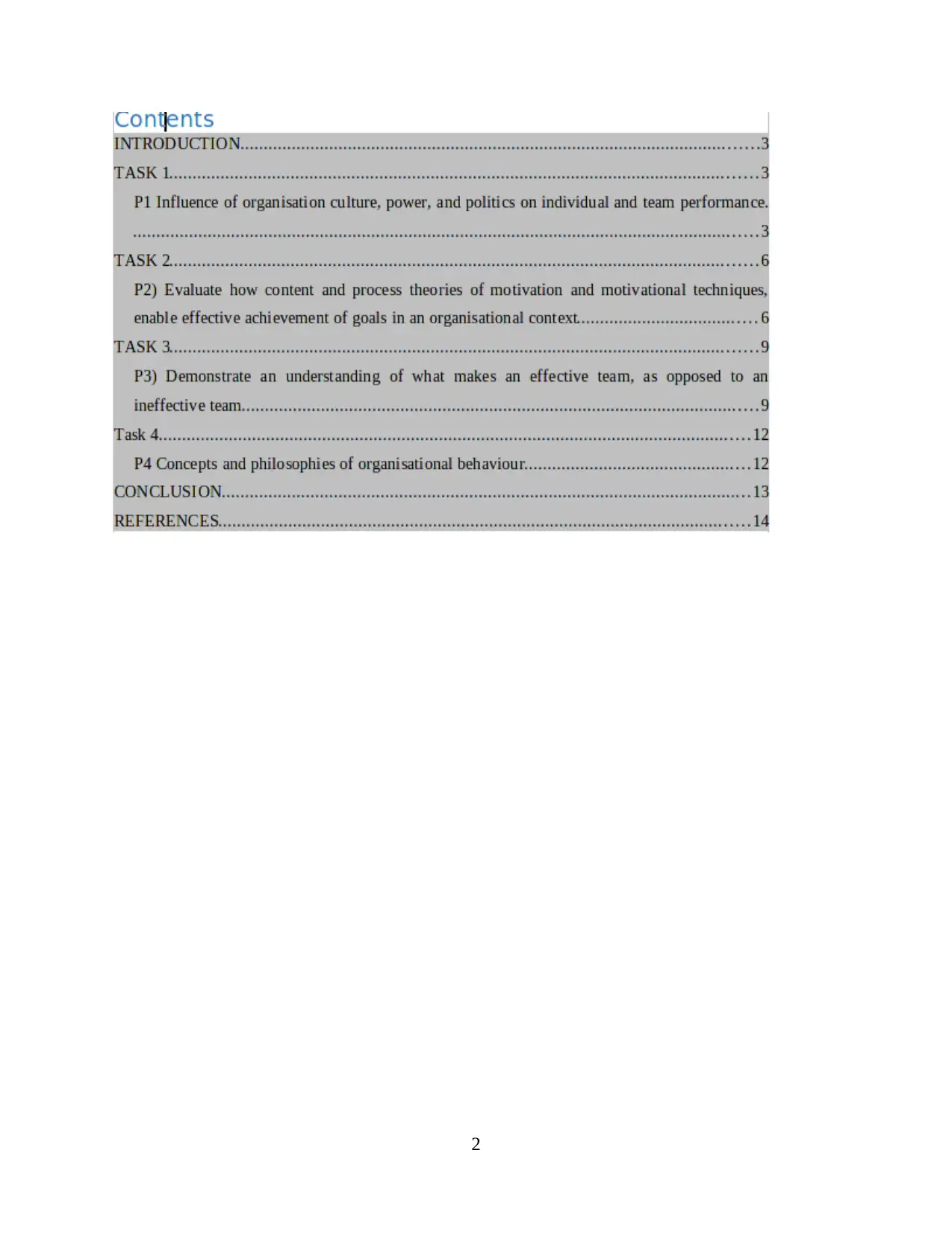
2
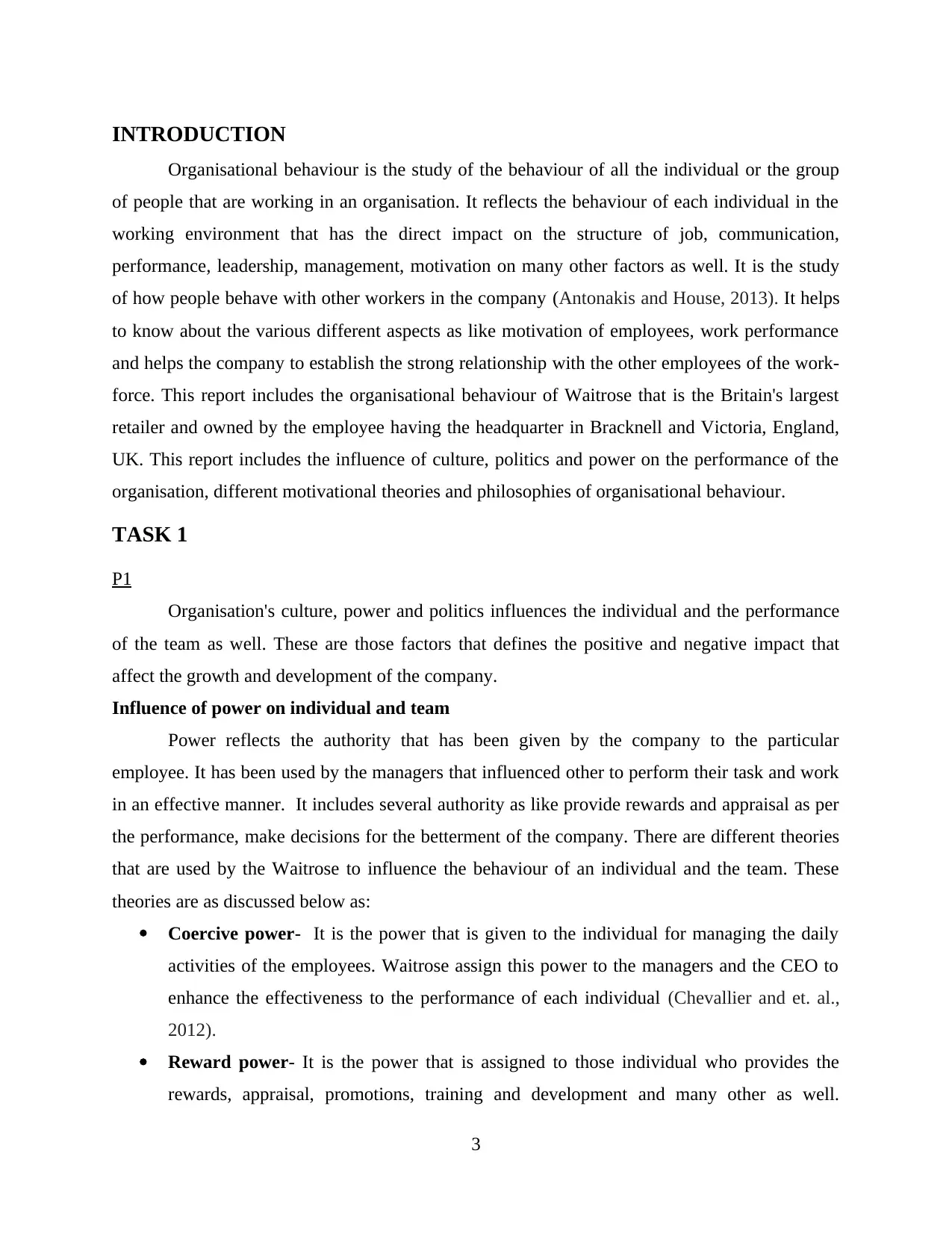
INTRODUCTION
Organisational behaviour is the study of the behaviour of all the individual or the group
of people that are working in an organisation. It reflects the behaviour of each individual in the
working environment that has the direct impact on the structure of job, communication,
performance, leadership, management, motivation on many other factors as well. It is the study
of how people behave with other workers in the company (Antonakis and House, 2013). It helps
to know about the various different aspects as like motivation of employees, work performance
and helps the company to establish the strong relationship with the other employees of the work-
force. This report includes the organisational behaviour of Waitrose that is the Britain's largest
retailer and owned by the employee having the headquarter in Bracknell and Victoria, England,
UK. This report includes the influence of culture, politics and power on the performance of the
organisation, different motivational theories and philosophies of organisational behaviour.
TASK 1
P1
Organisation's culture, power and politics influences the individual and the performance
of the team as well. These are those factors that defines the positive and negative impact that
affect the growth and development of the company.
Influence of power on individual and team
Power reflects the authority that has been given by the company to the particular
employee. It has been used by the managers that influenced other to perform their task and work
in an effective manner. It includes several authority as like provide rewards and appraisal as per
the performance, make decisions for the betterment of the company. There are different theories
that are used by the Waitrose to influence the behaviour of an individual and the team. These
theories are as discussed below as:
Coercive power- It is the power that is given to the individual for managing the daily
activities of the employees. Waitrose assign this power to the managers and the CEO to
enhance the effectiveness to the performance of each individual (Chevallier and et. al.,
2012).
Reward power- It is the power that is assigned to those individual who provides the
rewards, appraisal, promotions, training and development and many other as well.
3
Organisational behaviour is the study of the behaviour of all the individual or the group
of people that are working in an organisation. It reflects the behaviour of each individual in the
working environment that has the direct impact on the structure of job, communication,
performance, leadership, management, motivation on many other factors as well. It is the study
of how people behave with other workers in the company (Antonakis and House, 2013). It helps
to know about the various different aspects as like motivation of employees, work performance
and helps the company to establish the strong relationship with the other employees of the work-
force. This report includes the organisational behaviour of Waitrose that is the Britain's largest
retailer and owned by the employee having the headquarter in Bracknell and Victoria, England,
UK. This report includes the influence of culture, politics and power on the performance of the
organisation, different motivational theories and philosophies of organisational behaviour.
TASK 1
P1
Organisation's culture, power and politics influences the individual and the performance
of the team as well. These are those factors that defines the positive and negative impact that
affect the growth and development of the company.
Influence of power on individual and team
Power reflects the authority that has been given by the company to the particular
employee. It has been used by the managers that influenced other to perform their task and work
in an effective manner. It includes several authority as like provide rewards and appraisal as per
the performance, make decisions for the betterment of the company. There are different theories
that are used by the Waitrose to influence the behaviour of an individual and the team. These
theories are as discussed below as:
Coercive power- It is the power that is given to the individual for managing the daily
activities of the employees. Waitrose assign this power to the managers and the CEO to
enhance the effectiveness to the performance of each individual (Chevallier and et. al.,
2012).
Reward power- It is the power that is assigned to those individual who provides the
rewards, appraisal, promotions, training and development and many other as well.
3
⊘ This is a preview!⊘
Do you want full access?
Subscribe today to unlock all pages.

Trusted by 1+ million students worldwide
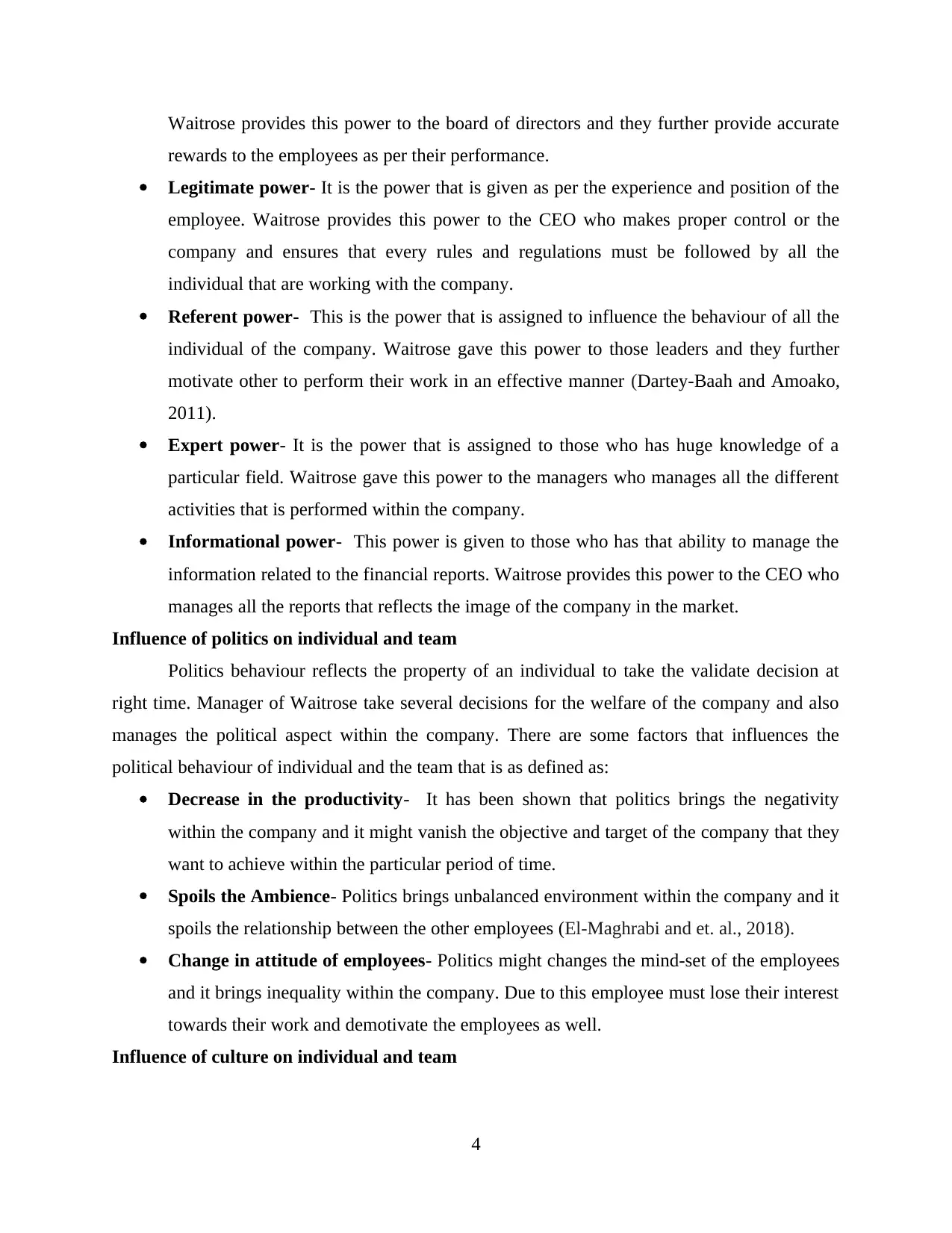
Waitrose provides this power to the board of directors and they further provide accurate
rewards to the employees as per their performance.
Legitimate power- It is the power that is given as per the experience and position of the
employee. Waitrose provides this power to the CEO who makes proper control or the
company and ensures that every rules and regulations must be followed by all the
individual that are working with the company.
Referent power- This is the power that is assigned to influence the behaviour of all the
individual of the company. Waitrose gave this power to those leaders and they further
motivate other to perform their work in an effective manner (Dartey-Baah and Amoako,
2011).
Expert power- It is the power that is assigned to those who has huge knowledge of a
particular field. Waitrose gave this power to the managers who manages all the different
activities that is performed within the company.
Informational power- This power is given to those who has that ability to manage the
information related to the financial reports. Waitrose provides this power to the CEO who
manages all the reports that reflects the image of the company in the market.
Influence of politics on individual and team
Politics behaviour reflects the property of an individual to take the validate decision at
right time. Manager of Waitrose take several decisions for the welfare of the company and also
manages the political aspect within the company. There are some factors that influences the
political behaviour of individual and the team that is as defined as:
Decrease in the productivity- It has been shown that politics brings the negativity
within the company and it might vanish the objective and target of the company that they
want to achieve within the particular period of time.
Spoils the Ambience- Politics brings unbalanced environment within the company and it
spoils the relationship between the other employees (El-Maghrabi and et. al., 2018).
Change in attitude of employees- Politics might changes the mind-set of the employees
and it brings inequality within the company. Due to this employee must lose their interest
towards their work and demotivate the employees as well.
Influence of culture on individual and team
4
rewards to the employees as per their performance.
Legitimate power- It is the power that is given as per the experience and position of the
employee. Waitrose provides this power to the CEO who makes proper control or the
company and ensures that every rules and regulations must be followed by all the
individual that are working with the company.
Referent power- This is the power that is assigned to influence the behaviour of all the
individual of the company. Waitrose gave this power to those leaders and they further
motivate other to perform their work in an effective manner (Dartey-Baah and Amoako,
2011).
Expert power- It is the power that is assigned to those who has huge knowledge of a
particular field. Waitrose gave this power to the managers who manages all the different
activities that is performed within the company.
Informational power- This power is given to those who has that ability to manage the
information related to the financial reports. Waitrose provides this power to the CEO who
manages all the reports that reflects the image of the company in the market.
Influence of politics on individual and team
Politics behaviour reflects the property of an individual to take the validate decision at
right time. Manager of Waitrose take several decisions for the welfare of the company and also
manages the political aspect within the company. There are some factors that influences the
political behaviour of individual and the team that is as defined as:
Decrease in the productivity- It has been shown that politics brings the negativity
within the company and it might vanish the objective and target of the company that they
want to achieve within the particular period of time.
Spoils the Ambience- Politics brings unbalanced environment within the company and it
spoils the relationship between the other employees (El-Maghrabi and et. al., 2018).
Change in attitude of employees- Politics might changes the mind-set of the employees
and it brings inequality within the company. Due to this employee must lose their interest
towards their work and demotivate the employees as well.
Influence of culture on individual and team
4
Paraphrase This Document
Need a fresh take? Get an instant paraphrase of this document with our AI Paraphraser
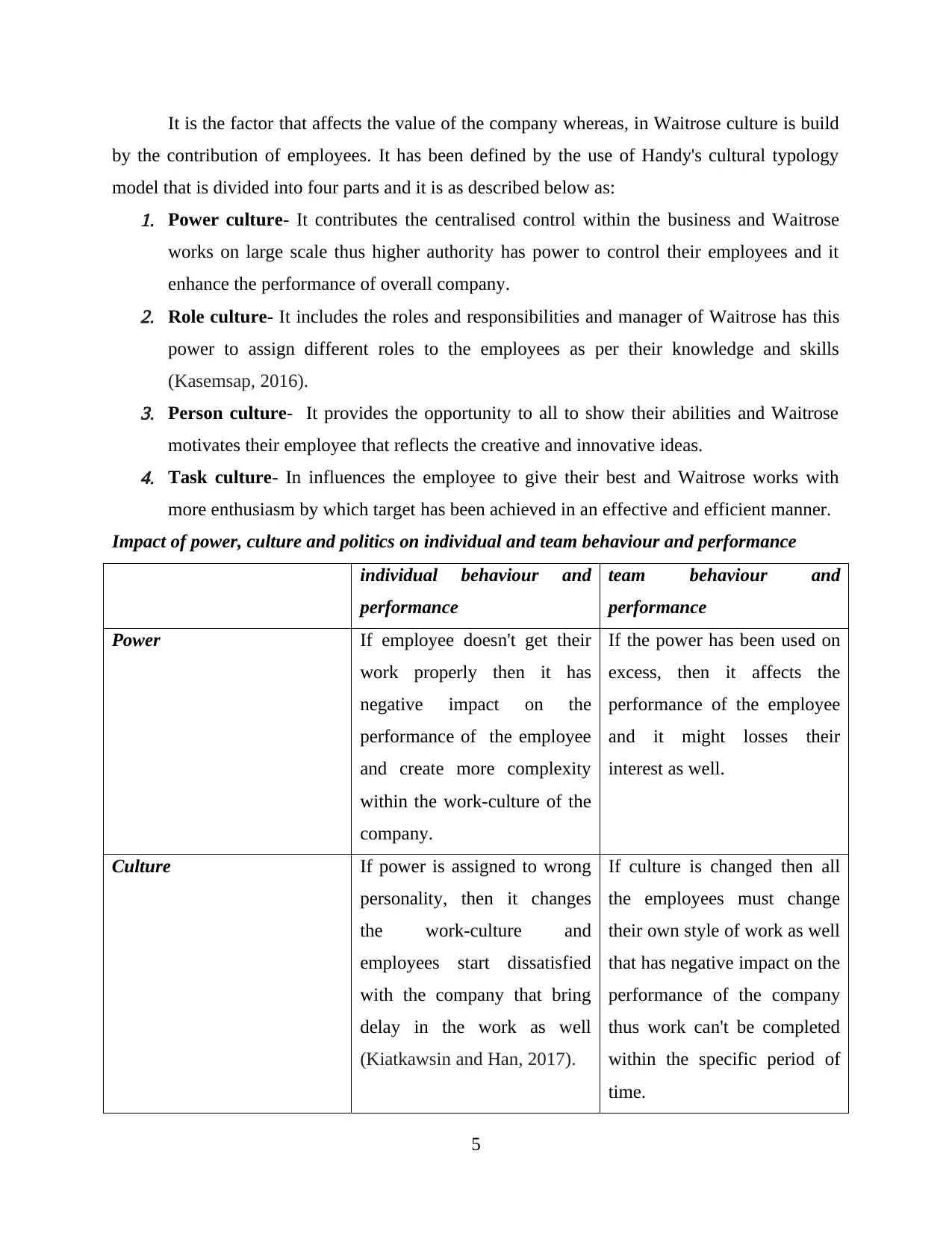
It is the factor that affects the value of the company whereas, in Waitrose culture is build
by the contribution of employees. It has been defined by the use of Handy's cultural typology
model that is divided into four parts and it is as described below as:1. Power culture- It contributes the centralised control within the business and Waitrose
works on large scale thus higher authority has power to control their employees and it
enhance the performance of overall company.2. Role culture- It includes the roles and responsibilities and manager of Waitrose has this
power to assign different roles to the employees as per their knowledge and skills
(Kasemsap, 2016).3. Person culture- It provides the opportunity to all to show their abilities and Waitrose
motivates their employee that reflects the creative and innovative ideas.4. Task culture- In influences the employee to give their best and Waitrose works with
more enthusiasm by which target has been achieved in an effective and efficient manner.
Impact of power, culture and politics on individual and team behaviour and performance
individual behaviour and
performance
team behaviour and
performance
Power If employee doesn't get their
work properly then it has
negative impact on the
performance of the employee
and create more complexity
within the work-culture of the
company.
If the power has been used on
excess, then it affects the
performance of the employee
and it might losses their
interest as well.
Culture If power is assigned to wrong
personality, then it changes
the work-culture and
employees start dissatisfied
with the company that bring
delay in the work as well
(Kiatkawsin and Han, 2017).
If culture is changed then all
the employees must change
their own style of work as well
that has negative impact on the
performance of the company
thus work can't be completed
within the specific period of
time.
5
by the contribution of employees. It has been defined by the use of Handy's cultural typology
model that is divided into four parts and it is as described below as:1. Power culture- It contributes the centralised control within the business and Waitrose
works on large scale thus higher authority has power to control their employees and it
enhance the performance of overall company.2. Role culture- It includes the roles and responsibilities and manager of Waitrose has this
power to assign different roles to the employees as per their knowledge and skills
(Kasemsap, 2016).3. Person culture- It provides the opportunity to all to show their abilities and Waitrose
motivates their employee that reflects the creative and innovative ideas.4. Task culture- In influences the employee to give their best and Waitrose works with
more enthusiasm by which target has been achieved in an effective and efficient manner.
Impact of power, culture and politics on individual and team behaviour and performance
individual behaviour and
performance
team behaviour and
performance
Power If employee doesn't get their
work properly then it has
negative impact on the
performance of the employee
and create more complexity
within the work-culture of the
company.
If the power has been used on
excess, then it affects the
performance of the employee
and it might losses their
interest as well.
Culture If power is assigned to wrong
personality, then it changes
the work-culture and
employees start dissatisfied
with the company that bring
delay in the work as well
(Kiatkawsin and Han, 2017).
If culture is changed then all
the employees must change
their own style of work as well
that has negative impact on the
performance of the company
thus work can't be completed
within the specific period of
time.
5
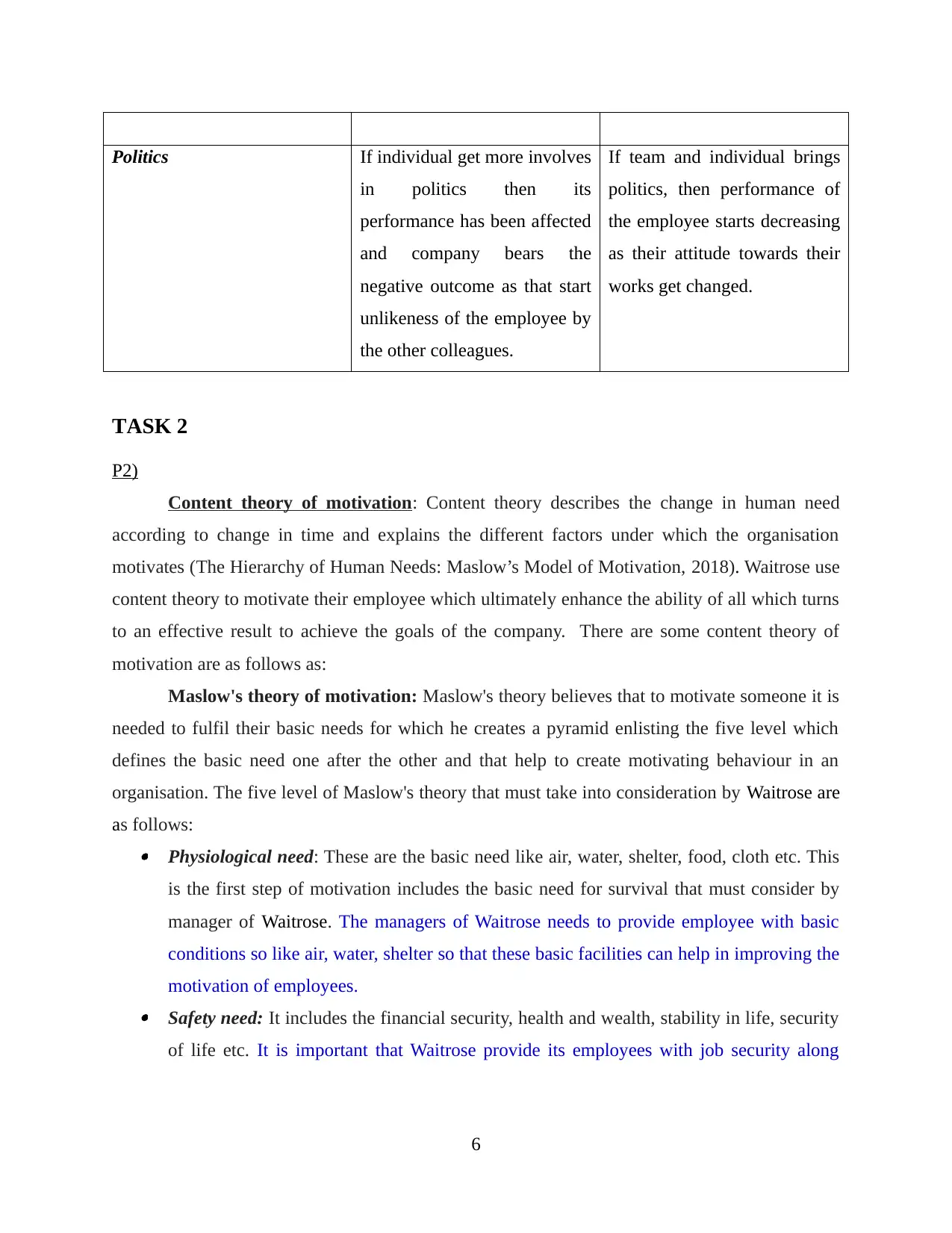
Politics If individual get more involves
in politics then its
performance has been affected
and company bears the
negative outcome as that start
unlikeness of the employee by
the other colleagues.
If team and individual brings
politics, then performance of
the employee starts decreasing
as their attitude towards their
works get changed.
TASK 2
P2)
Content theory of motivation: Content theory describes the change in human need
according to change in time and explains the different factors under which the organisation
motivates (The Hierarchy of Human Needs: Maslow’s Model of Motivation, 2018). Waitrose use
content theory to motivate their employee which ultimately enhance the ability of all which turns
to an effective result to achieve the goals of the company. There are some content theory of
motivation are as follows as:
Maslow's theory of motivation: Maslow's theory believes that to motivate someone it is
needed to fulfil their basic needs for which he creates a pyramid enlisting the five level which
defines the basic need one after the other and that help to create motivating behaviour in an
organisation. The five level of Maslow's theory that must take into consideration by Waitrose are
as follows: Physiological need: These are the basic need like air, water, shelter, food, cloth etc. This
is the first step of motivation includes the basic need for survival that must consider by
manager of Waitrose. The managers of Waitrose needs to provide employee with basic
conditions so like air, water, shelter so that these basic facilities can help in improving the
motivation of employees. Safety need: It includes the financial security, health and wealth, stability in life, security
of life etc. It is important that Waitrose provide its employees with job security along
6
in politics then its
performance has been affected
and company bears the
negative outcome as that start
unlikeness of the employee by
the other colleagues.
If team and individual brings
politics, then performance of
the employee starts decreasing
as their attitude towards their
works get changed.
TASK 2
P2)
Content theory of motivation: Content theory describes the change in human need
according to change in time and explains the different factors under which the organisation
motivates (The Hierarchy of Human Needs: Maslow’s Model of Motivation, 2018). Waitrose use
content theory to motivate their employee which ultimately enhance the ability of all which turns
to an effective result to achieve the goals of the company. There are some content theory of
motivation are as follows as:
Maslow's theory of motivation: Maslow's theory believes that to motivate someone it is
needed to fulfil their basic needs for which he creates a pyramid enlisting the five level which
defines the basic need one after the other and that help to create motivating behaviour in an
organisation. The five level of Maslow's theory that must take into consideration by Waitrose are
as follows: Physiological need: These are the basic need like air, water, shelter, food, cloth etc. This
is the first step of motivation includes the basic need for survival that must consider by
manager of Waitrose. The managers of Waitrose needs to provide employee with basic
conditions so like air, water, shelter so that these basic facilities can help in improving the
motivation of employees. Safety need: It includes the financial security, health and wealth, stability in life, security
of life etc. It is important that Waitrose provide its employees with job security along
6
⊘ This is a preview!⊘
Do you want full access?
Subscribe today to unlock all pages.

Trusted by 1+ million students worldwide
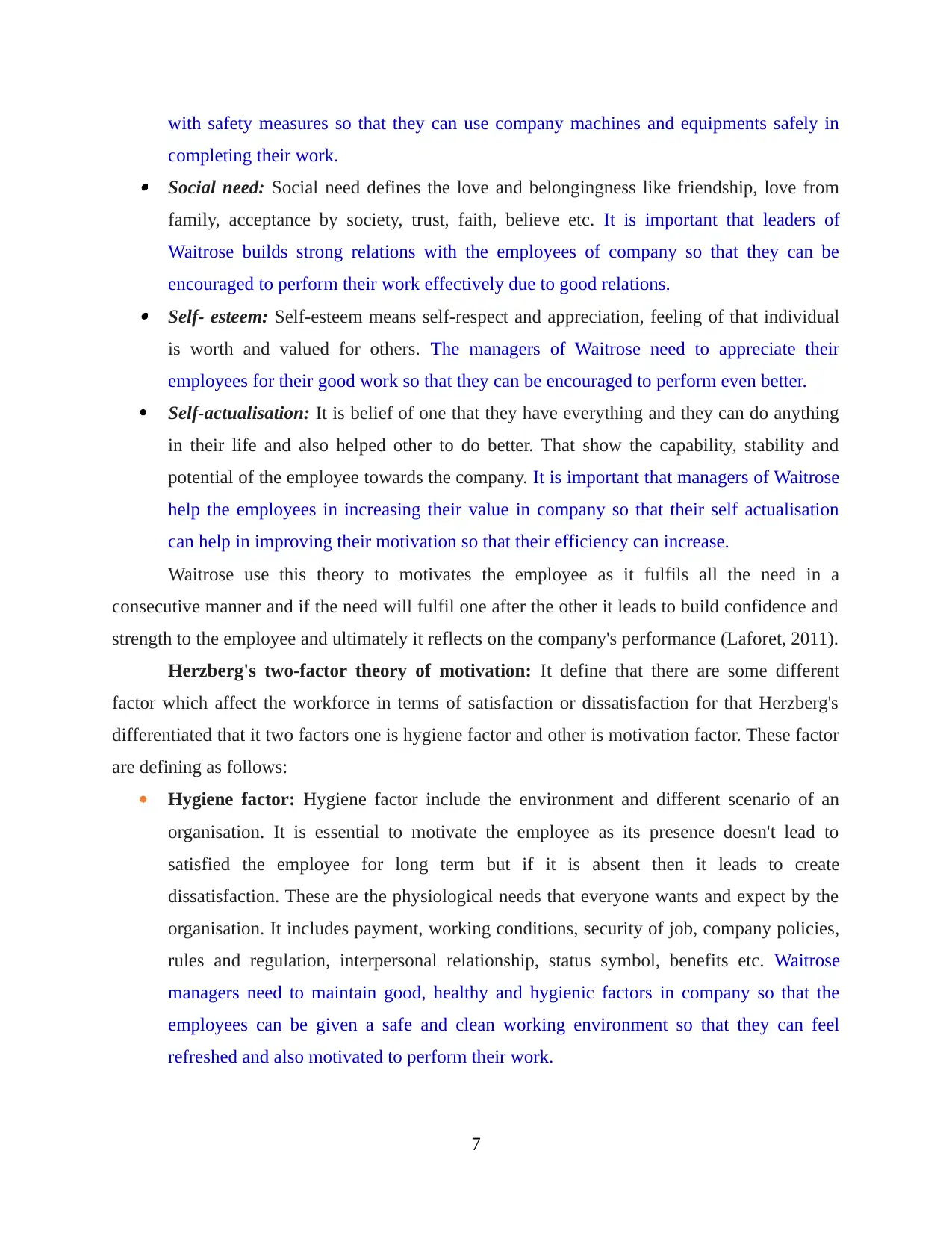
with safety measures so that they can use company machines and equipments safely in
completing their work. Social need: Social need defines the love and belongingness like friendship, love from
family, acceptance by society, trust, faith, believe etc. It is important that leaders of
Waitrose builds strong relations with the employees of company so that they can be
encouraged to perform their work effectively due to good relations. Self- esteem: Self-esteem means self-respect and appreciation, feeling of that individual
is worth and valued for others. The managers of Waitrose need to appreciate their
employees for their good work so that they can be encouraged to perform even better.
Self-actualisation: It is belief of one that they have everything and they can do anything
in their life and also helped other to do better. That show the capability, stability and
potential of the employee towards the company. It is important that managers of Waitrose
help the employees in increasing their value in company so that their self actualisation
can help in improving their motivation so that their efficiency can increase.
Waitrose use this theory to motivates the employee as it fulfils all the need in a
consecutive manner and if the need will fulfil one after the other it leads to build confidence and
strength to the employee and ultimately it reflects on the company's performance (Laforet, 2011).
Herzberg's two-factor theory of motivation: It define that there are some different
factor which affect the workforce in terms of satisfaction or dissatisfaction for that Herzberg's
differentiated that it two factors one is hygiene factor and other is motivation factor. These factor
are defining as follows:
Hygiene factor: Hygiene factor include the environment and different scenario of an
organisation. It is essential to motivate the employee as its presence doesn't lead to
satisfied the employee for long term but if it is absent then it leads to create
dissatisfaction. These are the physiological needs that everyone wants and expect by the
organisation. It includes payment, working conditions, security of job, company policies,
rules and regulation, interpersonal relationship, status symbol, benefits etc. Waitrose
managers need to maintain good, healthy and hygienic factors in company so that the
employees can be given a safe and clean working environment so that they can feel
refreshed and also motivated to perform their work.
7
completing their work. Social need: Social need defines the love and belongingness like friendship, love from
family, acceptance by society, trust, faith, believe etc. It is important that leaders of
Waitrose builds strong relations with the employees of company so that they can be
encouraged to perform their work effectively due to good relations. Self- esteem: Self-esteem means self-respect and appreciation, feeling of that individual
is worth and valued for others. The managers of Waitrose need to appreciate their
employees for their good work so that they can be encouraged to perform even better.
Self-actualisation: It is belief of one that they have everything and they can do anything
in their life and also helped other to do better. That show the capability, stability and
potential of the employee towards the company. It is important that managers of Waitrose
help the employees in increasing their value in company so that their self actualisation
can help in improving their motivation so that their efficiency can increase.
Waitrose use this theory to motivates the employee as it fulfils all the need in a
consecutive manner and if the need will fulfil one after the other it leads to build confidence and
strength to the employee and ultimately it reflects on the company's performance (Laforet, 2011).
Herzberg's two-factor theory of motivation: It define that there are some different
factor which affect the workforce in terms of satisfaction or dissatisfaction for that Herzberg's
differentiated that it two factors one is hygiene factor and other is motivation factor. These factor
are defining as follows:
Hygiene factor: Hygiene factor include the environment and different scenario of an
organisation. It is essential to motivate the employee as its presence doesn't lead to
satisfied the employee for long term but if it is absent then it leads to create
dissatisfaction. These are the physiological needs that everyone wants and expect by the
organisation. It includes payment, working conditions, security of job, company policies,
rules and regulation, interpersonal relationship, status symbol, benefits etc. Waitrose
managers need to maintain good, healthy and hygienic factors in company so that the
employees can be given a safe and clean working environment so that they can feel
refreshed and also motivated to perform their work.
7
Paraphrase This Document
Need a fresh take? Get an instant paraphrase of this document with our AI Paraphraser
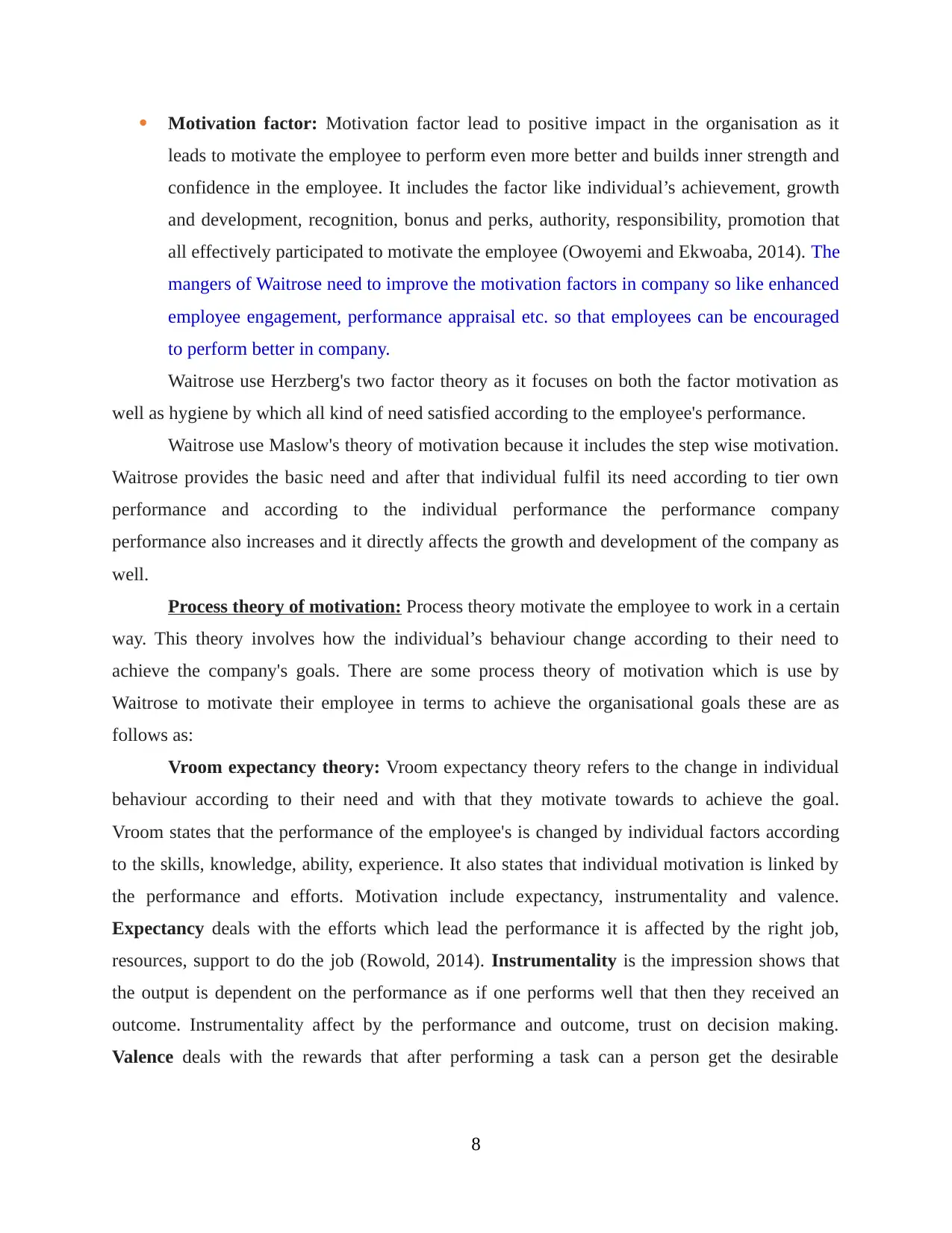
Motivation factor: Motivation factor lead to positive impact in the organisation as it
leads to motivate the employee to perform even more better and builds inner strength and
confidence in the employee. It includes the factor like individual’s achievement, growth
and development, recognition, bonus and perks, authority, responsibility, promotion that
all effectively participated to motivate the employee (Owoyemi and Ekwoaba, 2014). The
mangers of Waitrose need to improve the motivation factors in company so like enhanced
employee engagement, performance appraisal etc. so that employees can be encouraged
to perform better in company.
Waitrose use Herzberg's two factor theory as it focuses on both the factor motivation as
well as hygiene by which all kind of need satisfied according to the employee's performance.
Waitrose use Maslow's theory of motivation because it includes the step wise motivation.
Waitrose provides the basic need and after that individual fulfil its need according to tier own
performance and according to the individual performance the performance company
performance also increases and it directly affects the growth and development of the company as
well.
Process theory of motivation: Process theory motivate the employee to work in a certain
way. This theory involves how the individual’s behaviour change according to their need to
achieve the company's goals. There are some process theory of motivation which is use by
Waitrose to motivate their employee in terms to achieve the organisational goals these are as
follows as:
Vroom expectancy theory: Vroom expectancy theory refers to the change in individual
behaviour according to their need and with that they motivate towards to achieve the goal.
Vroom states that the performance of the employee's is changed by individual factors according
to the skills, knowledge, ability, experience. It also states that individual motivation is linked by
the performance and efforts. Motivation include expectancy, instrumentality and valence.
Expectancy deals with the efforts which lead the performance it is affected by the right job,
resources, support to do the job (Rowold, 2014). Instrumentality is the impression shows that
the output is dependent on the performance as if one performs well that then they received an
outcome. Instrumentality affect by the performance and outcome, trust on decision making.
Valence deals with the rewards that after performing a task can a person get the desirable
8
leads to motivate the employee to perform even more better and builds inner strength and
confidence in the employee. It includes the factor like individual’s achievement, growth
and development, recognition, bonus and perks, authority, responsibility, promotion that
all effectively participated to motivate the employee (Owoyemi and Ekwoaba, 2014). The
mangers of Waitrose need to improve the motivation factors in company so like enhanced
employee engagement, performance appraisal etc. so that employees can be encouraged
to perform better in company.
Waitrose use Herzberg's two factor theory as it focuses on both the factor motivation as
well as hygiene by which all kind of need satisfied according to the employee's performance.
Waitrose use Maslow's theory of motivation because it includes the step wise motivation.
Waitrose provides the basic need and after that individual fulfil its need according to tier own
performance and according to the individual performance the performance company
performance also increases and it directly affects the growth and development of the company as
well.
Process theory of motivation: Process theory motivate the employee to work in a certain
way. This theory involves how the individual’s behaviour change according to their need to
achieve the company's goals. There are some process theory of motivation which is use by
Waitrose to motivate their employee in terms to achieve the organisational goals these are as
follows as:
Vroom expectancy theory: Vroom expectancy theory refers to the change in individual
behaviour according to their need and with that they motivate towards to achieve the goal.
Vroom states that the performance of the employee's is changed by individual factors according
to the skills, knowledge, ability, experience. It also states that individual motivation is linked by
the performance and efforts. Motivation include expectancy, instrumentality and valence.
Expectancy deals with the efforts which lead the performance it is affected by the right job,
resources, support to do the job (Rowold, 2014). Instrumentality is the impression shows that
the output is dependent on the performance as if one performs well that then they received an
outcome. Instrumentality affect by the performance and outcome, trust on decision making.
Valence deals with the rewards that after performing a task can a person get the desirable
8
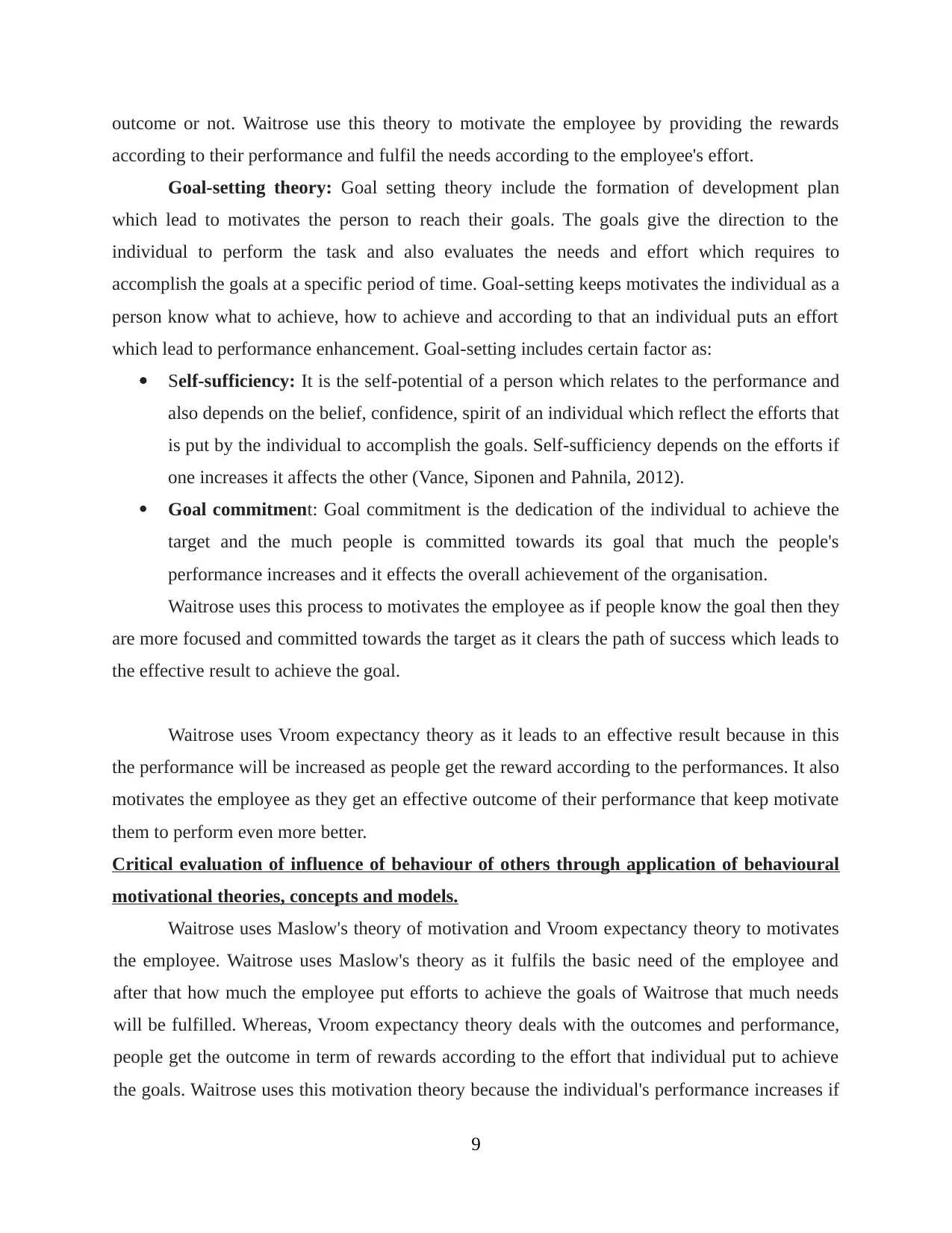
outcome or not. Waitrose use this theory to motivate the employee by providing the rewards
according to their performance and fulfil the needs according to the employee's effort.
Goal-setting theory: Goal setting theory include the formation of development plan
which lead to motivates the person to reach their goals. The goals give the direction to the
individual to perform the task and also evaluates the needs and effort which requires to
accomplish the goals at a specific period of time. Goal-setting keeps motivates the individual as a
person know what to achieve, how to achieve and according to that an individual puts an effort
which lead to performance enhancement. Goal-setting includes certain factor as:
Self-sufficiency: It is the self-potential of a person which relates to the performance and
also depends on the belief, confidence, spirit of an individual which reflect the efforts that
is put by the individual to accomplish the goals. Self-sufficiency depends on the efforts if
one increases it affects the other (Vance, Siponen and Pahnila, 2012).
Goal commitment: Goal commitment is the dedication of the individual to achieve the
target and the much people is committed towards its goal that much the people's
performance increases and it effects the overall achievement of the organisation.
Waitrose uses this process to motivates the employee as if people know the goal then they
are more focused and committed towards the target as it clears the path of success which leads to
the effective result to achieve the goal.
Waitrose uses Vroom expectancy theory as it leads to an effective result because in this
the performance will be increased as people get the reward according to the performances. It also
motivates the employee as they get an effective outcome of their performance that keep motivate
them to perform even more better.
Critical evaluation of influence of behaviour of others through application of behavioural
motivational theories, concepts and models.
Waitrose uses Maslow's theory of motivation and Vroom expectancy theory to motivates
the employee. Waitrose uses Maslow's theory as it fulfils the basic need of the employee and
after that how much the employee put efforts to achieve the goals of Waitrose that much needs
will be fulfilled. Whereas, Vroom expectancy theory deals with the outcomes and performance,
people get the outcome in term of rewards according to the effort that individual put to achieve
the goals. Waitrose uses this motivation theory because the individual's performance increases if
9
according to their performance and fulfil the needs according to the employee's effort.
Goal-setting theory: Goal setting theory include the formation of development plan
which lead to motivates the person to reach their goals. The goals give the direction to the
individual to perform the task and also evaluates the needs and effort which requires to
accomplish the goals at a specific period of time. Goal-setting keeps motivates the individual as a
person know what to achieve, how to achieve and according to that an individual puts an effort
which lead to performance enhancement. Goal-setting includes certain factor as:
Self-sufficiency: It is the self-potential of a person which relates to the performance and
also depends on the belief, confidence, spirit of an individual which reflect the efforts that
is put by the individual to accomplish the goals. Self-sufficiency depends on the efforts if
one increases it affects the other (Vance, Siponen and Pahnila, 2012).
Goal commitment: Goal commitment is the dedication of the individual to achieve the
target and the much people is committed towards its goal that much the people's
performance increases and it effects the overall achievement of the organisation.
Waitrose uses this process to motivates the employee as if people know the goal then they
are more focused and committed towards the target as it clears the path of success which leads to
the effective result to achieve the goal.
Waitrose uses Vroom expectancy theory as it leads to an effective result because in this
the performance will be increased as people get the reward according to the performances. It also
motivates the employee as they get an effective outcome of their performance that keep motivate
them to perform even more better.
Critical evaluation of influence of behaviour of others through application of behavioural
motivational theories, concepts and models.
Waitrose uses Maslow's theory of motivation and Vroom expectancy theory to motivates
the employee. Waitrose uses Maslow's theory as it fulfils the basic need of the employee and
after that how much the employee put efforts to achieve the goals of Waitrose that much needs
will be fulfilled. Whereas, Vroom expectancy theory deals with the outcomes and performance,
people get the outcome in term of rewards according to the effort that individual put to achieve
the goals. Waitrose uses this motivation theory because the individual's performance increases if
9
⊘ This is a preview!⊘
Do you want full access?
Subscribe today to unlock all pages.

Trusted by 1+ million students worldwide
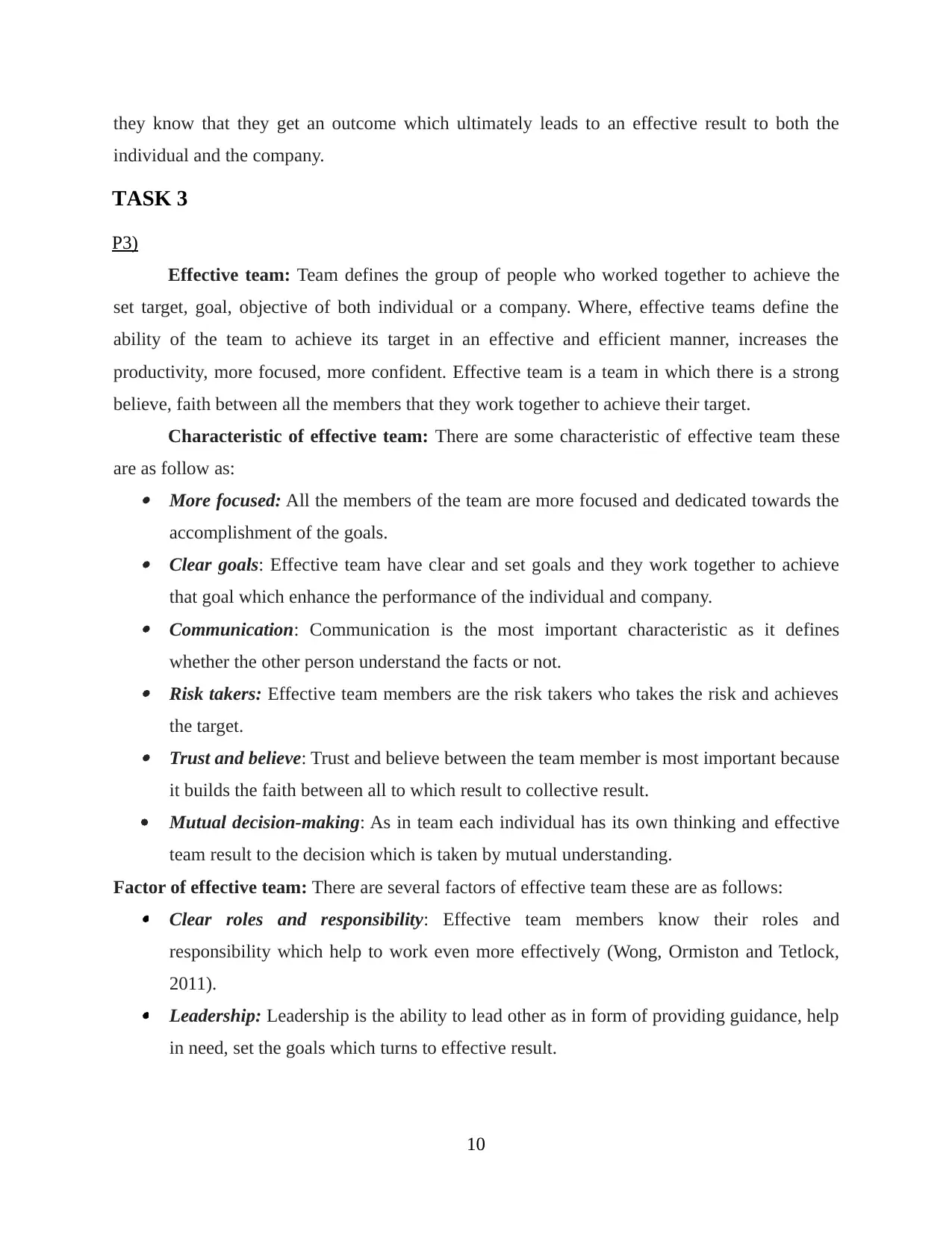
they know that they get an outcome which ultimately leads to an effective result to both the
individual and the company.
TASK 3
P3)
Effective team: Team defines the group of people who worked together to achieve the
set target, goal, objective of both individual or a company. Where, effective teams define the
ability of the team to achieve its target in an effective and efficient manner, increases the
productivity, more focused, more confident. Effective team is a team in which there is a strong
believe, faith between all the members that they work together to achieve their target.
Characteristic of effective team: There are some characteristic of effective team these
are as follow as: More focused: All the members of the team are more focused and dedicated towards the
accomplishment of the goals. Clear goals: Effective team have clear and set goals and they work together to achieve
that goal which enhance the performance of the individual and company. Communication: Communication is the most important characteristic as it defines
whether the other person understand the facts or not. Risk takers: Effective team members are the risk takers who takes the risk and achieves
the target. Trust and believe: Trust and believe between the team member is most important because
it builds the faith between all to which result to collective result.
Mutual decision-making: As in team each individual has its own thinking and effective
team result to the decision which is taken by mutual understanding.
Factor of effective team: There are several factors of effective team these are as follows: Clear roles and responsibility: Effective team members know their roles and
responsibility which help to work even more effectively (Wong, Ormiston and Tetlock,
2011). Leadership: Leadership is the ability to lead other as in form of providing guidance, help
in need, set the goals which turns to effective result.
10
individual and the company.
TASK 3
P3)
Effective team: Team defines the group of people who worked together to achieve the
set target, goal, objective of both individual or a company. Where, effective teams define the
ability of the team to achieve its target in an effective and efficient manner, increases the
productivity, more focused, more confident. Effective team is a team in which there is a strong
believe, faith between all the members that they work together to achieve their target.
Characteristic of effective team: There are some characteristic of effective team these
are as follow as: More focused: All the members of the team are more focused and dedicated towards the
accomplishment of the goals. Clear goals: Effective team have clear and set goals and they work together to achieve
that goal which enhance the performance of the individual and company. Communication: Communication is the most important characteristic as it defines
whether the other person understand the facts or not. Risk takers: Effective team members are the risk takers who takes the risk and achieves
the target. Trust and believe: Trust and believe between the team member is most important because
it builds the faith between all to which result to collective result.
Mutual decision-making: As in team each individual has its own thinking and effective
team result to the decision which is taken by mutual understanding.
Factor of effective team: There are several factors of effective team these are as follows: Clear roles and responsibility: Effective team members know their roles and
responsibility which help to work even more effectively (Wong, Ormiston and Tetlock,
2011). Leadership: Leadership is the ability to lead other as in form of providing guidance, help
in need, set the goals which turns to effective result.
10
Paraphrase This Document
Need a fresh take? Get an instant paraphrase of this document with our AI Paraphraser
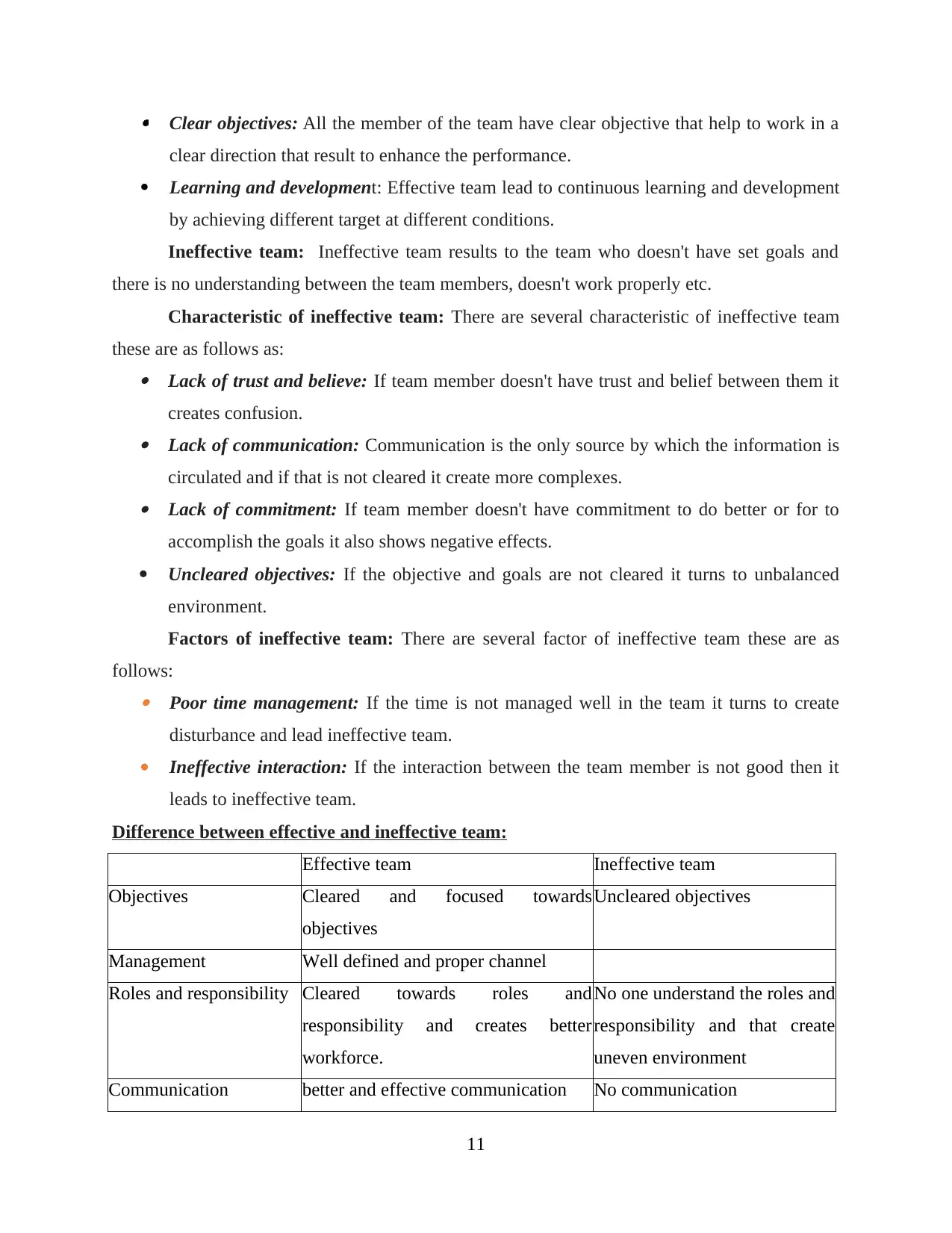
Clear objectives: All the member of the team have clear objective that help to work in a
clear direction that result to enhance the performance.
Learning and development: Effective team lead to continuous learning and development
by achieving different target at different conditions.
Ineffective team: Ineffective team results to the team who doesn't have set goals and
there is no understanding between the team members, doesn't work properly etc.
Characteristic of ineffective team: There are several characteristic of ineffective team
these are as follows as: Lack of trust and believe: If team member doesn't have trust and belief between them it
creates confusion. Lack of communication: Communication is the only source by which the information is
circulated and if that is not cleared it create more complexes. Lack of commitment: If team member doesn't have commitment to do better or for to
accomplish the goals it also shows negative effects.
Uncleared objectives: If the objective and goals are not cleared it turns to unbalanced
environment.
Factors of ineffective team: There are several factor of ineffective team these are as
follows: Poor time management: If the time is not managed well in the team it turns to create
disturbance and lead ineffective team.
Ineffective interaction: If the interaction between the team member is not good then it
leads to ineffective team.
Difference between effective and ineffective team:
Effective team Ineffective team
Objectives Cleared and focused towards
objectives
Uncleared objectives
Management Well defined and proper channel
Roles and responsibility Cleared towards roles and
responsibility and creates better
workforce.
No one understand the roles and
responsibility and that create
uneven environment
Communication better and effective communication No communication
11
clear direction that result to enhance the performance.
Learning and development: Effective team lead to continuous learning and development
by achieving different target at different conditions.
Ineffective team: Ineffective team results to the team who doesn't have set goals and
there is no understanding between the team members, doesn't work properly etc.
Characteristic of ineffective team: There are several characteristic of ineffective team
these are as follows as: Lack of trust and believe: If team member doesn't have trust and belief between them it
creates confusion. Lack of communication: Communication is the only source by which the information is
circulated and if that is not cleared it create more complexes. Lack of commitment: If team member doesn't have commitment to do better or for to
accomplish the goals it also shows negative effects.
Uncleared objectives: If the objective and goals are not cleared it turns to unbalanced
environment.
Factors of ineffective team: There are several factor of ineffective team these are as
follows: Poor time management: If the time is not managed well in the team it turns to create
disturbance and lead ineffective team.
Ineffective interaction: If the interaction between the team member is not good then it
leads to ineffective team.
Difference between effective and ineffective team:
Effective team Ineffective team
Objectives Cleared and focused towards
objectives
Uncleared objectives
Management Well defined and proper channel
Roles and responsibility Cleared towards roles and
responsibility and creates better
workforce.
No one understand the roles and
responsibility and that create
uneven environment
Communication better and effective communication No communication
11
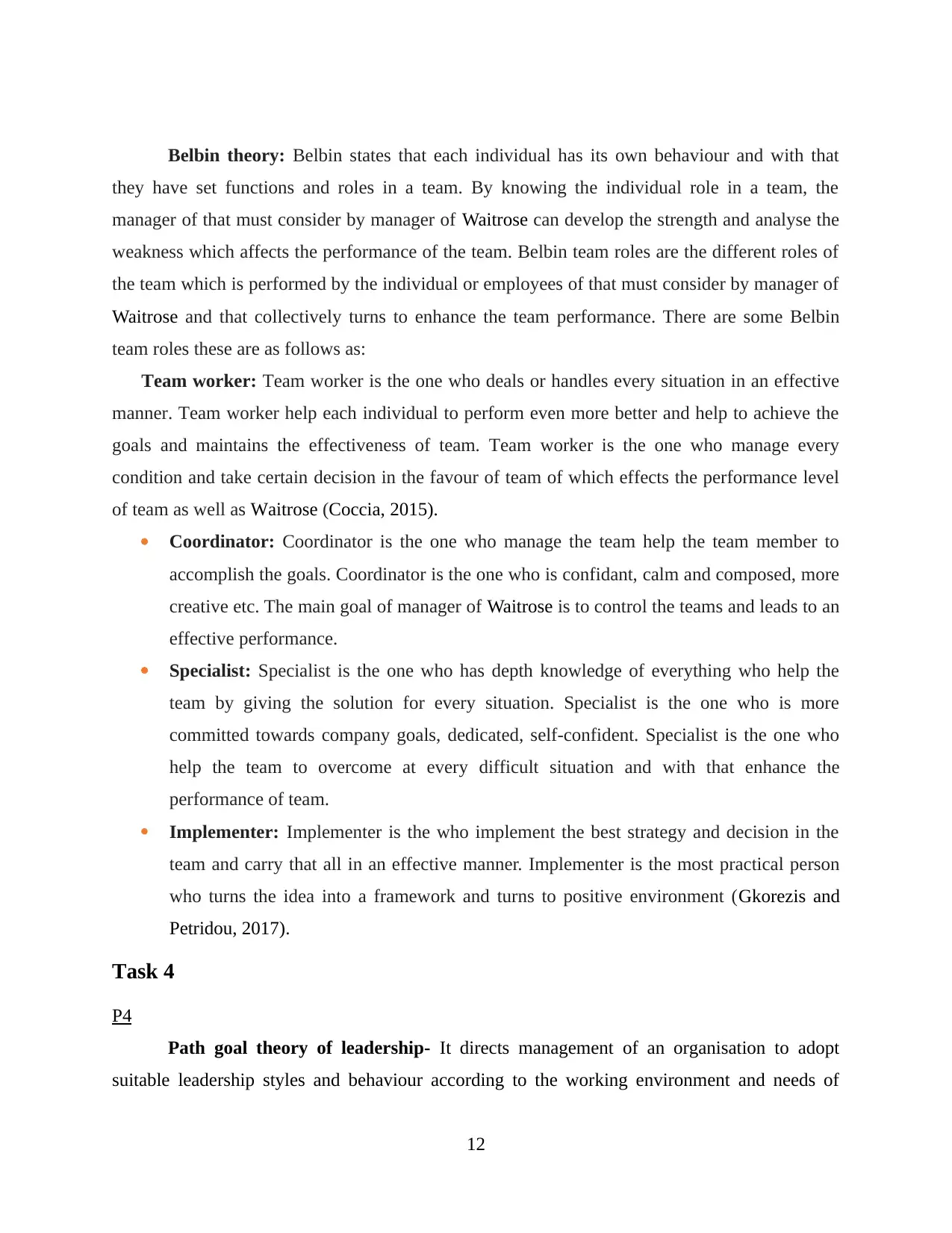
Belbin theory: Belbin states that each individual has its own behaviour and with that
they have set functions and roles in a team. By knowing the individual role in a team, the
manager of that must consider by manager of Waitrose can develop the strength and analyse the
weakness which affects the performance of the team. Belbin team roles are the different roles of
the team which is performed by the individual or employees of that must consider by manager of
Waitrose and that collectively turns to enhance the team performance. There are some Belbin
team roles these are as follows as:
Team worker: Team worker is the one who deals or handles every situation in an effective
manner. Team worker help each individual to perform even more better and help to achieve the
goals and maintains the effectiveness of team. Team worker is the one who manage every
condition and take certain decision in the favour of team of which effects the performance level
of team as well as Waitrose (Coccia, 2015).
Coordinator: Coordinator is the one who manage the team help the team member to
accomplish the goals. Coordinator is the one who is confidant, calm and composed, more
creative etc. The main goal of manager of Waitrose is to control the teams and leads to an
effective performance.
Specialist: Specialist is the one who has depth knowledge of everything who help the
team by giving the solution for every situation. Specialist is the one who is more
committed towards company goals, dedicated, self-confident. Specialist is the one who
help the team to overcome at every difficult situation and with that enhance the
performance of team.
Implementer: Implementer is the who implement the best strategy and decision in the
team and carry that all in an effective manner. Implementer is the most practical person
who turns the idea into a framework and turns to positive environment (Gkorezis and
Petridou, 2017).
Task 4
P4
Path goal theory of leadership- It directs management of an organisation to adopt
suitable leadership styles and behaviour according to the working environment and needs of
12
they have set functions and roles in a team. By knowing the individual role in a team, the
manager of that must consider by manager of Waitrose can develop the strength and analyse the
weakness which affects the performance of the team. Belbin team roles are the different roles of
the team which is performed by the individual or employees of that must consider by manager of
Waitrose and that collectively turns to enhance the team performance. There are some Belbin
team roles these are as follows as:
Team worker: Team worker is the one who deals or handles every situation in an effective
manner. Team worker help each individual to perform even more better and help to achieve the
goals and maintains the effectiveness of team. Team worker is the one who manage every
condition and take certain decision in the favour of team of which effects the performance level
of team as well as Waitrose (Coccia, 2015).
Coordinator: Coordinator is the one who manage the team help the team member to
accomplish the goals. Coordinator is the one who is confidant, calm and composed, more
creative etc. The main goal of manager of Waitrose is to control the teams and leads to an
effective performance.
Specialist: Specialist is the one who has depth knowledge of everything who help the
team by giving the solution for every situation. Specialist is the one who is more
committed towards company goals, dedicated, self-confident. Specialist is the one who
help the team to overcome at every difficult situation and with that enhance the
performance of team.
Implementer: Implementer is the who implement the best strategy and decision in the
team and carry that all in an effective manner. Implementer is the most practical person
who turns the idea into a framework and turns to positive environment (Gkorezis and
Petridou, 2017).
Task 4
P4
Path goal theory of leadership- It directs management of an organisation to adopt
suitable leadership styles and behaviour according to the working environment and needs of
12
⊘ This is a preview!⊘
Do you want full access?
Subscribe today to unlock all pages.

Trusted by 1+ million students worldwide
1 out of 15
Related Documents
Your All-in-One AI-Powered Toolkit for Academic Success.
+13062052269
info@desklib.com
Available 24*7 on WhatsApp / Email
![[object Object]](/_next/static/media/star-bottom.7253800d.svg)
Unlock your academic potential
Copyright © 2020–2026 A2Z Services. All Rights Reserved. Developed and managed by ZUCOL.




